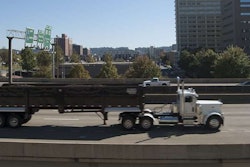President Donald Trump on Wednesday hit the banks of the Ohio River in Cincinnati to push the infrastructure funding proposal he issued last month. He called on Congress to adopt his proposal for clipping federal funding for U.S. highways in exchange for incentivizing private companies to pour $800 billion into roads, bridges, waterways and other transportation infrastructure.
The speech comes as part of the Trump Administration’s push to recognize Infrastructure Week, an informal week in which lawmakers, the public and roads groups call for investment in failing U.S. infrastructure. In addition to the Wednesday speech, Trump is scheduled to speak Friday to the Department of Transportation and other transportation stakeholders. The president on Monday called for privatizing the country’s air traffic controllers.
Trump’s proposal, for which few details have been released, offers $200 billion in federal tax incentives and seed funding in hopes of drawing private companies, states and localities to spend $800 billion over 10 years. The total spending goals add to $1 trillion — the number Trump has touted since his presidential campaign. The White House has not said how it plans to fund the $200 billion investment, which has been a key sticking point for infrastructure funding proposals in recent years.

Trump on Wednesday cited the Panama Canal and the Interstate system as notable U.S. transportation achievements, then deriding the current state of U.S. highways. “We don’t do that anymore,” he noted. “We don’t even fix the old highways anymore. We’re going to get them going again like they never have before. There are companies here prepared to work with us to make sure the right infrastructure gets built and gets built quickly.”
Notably for trucking, Trump’s plan also calls for a repeal of the tolling ban on existing Interstate lanes and privatizing rest areas.
Greg Cohen, head of the D.C.-based Highway Users Alliance, says Trump’s proposal could be a starting point for lawmakers on an infrastructure bill. But the proposal has little chance of passing Congress, he says.
“There is a lot of opposition to that in the districts themselves, and members of Congress, who are closer to individual districts, are going to be much more reticent to approve that,” he said.
Cohen said Trump’s plan also neglects support for boosting the Highway Trust Fund, which has operated with a massive deficit for years. Congress would prefer a measure to stabilize the fund, Cohen says.
Even before Trump’s May proposal for incentivizing private sector investment in U.S. highways, Trump’s idea to supplement federal dollars with private funding drew criticism, particularly for the idea’s likely reliance on tolling to bridge the funding gap.
Private spending “sounds good to the financial community, but it generally doesn’t play well on Main Street — it simply means more tolls,” Todd Spencer, Executive Vice President of the Owner-Operator Independent Drivers Association, told Overdrive in November shortly after the 2016 election. OOIDA is “open to sustainable funding that’s fair to highway users. The tried and true mechanism of paying for roads and bridges is through fuel taxes. If that’s ruled out, the dilemma gets bigger and harder to resolve.”
Stephanie Kane, spokesperson for the Alliance for Toll-Free Interstates, reiterated that point Wednesday after Trump’s Ohio speech. “When President Trump spoke today about ‘private dollars’ in infrastructure, specifically relating to surface transportation, he is talking about tolls. Tolls will not fill our infrastructure deficit because tolls rob everyday drivers to line the pockets of Wall Street and international investors. Tolls are the worst funding mechanism available and are a highly inefficient use of funds.”
The American Trucking Associations also opposes such funding, having in recent years pressed for an increase in fuel taxes, which have funded the Highway Trust Fund since the 1950s. Federal fuel tax rates have not been increased since the early 1990s, and inflation and more fuel-efficient vehicles have undercut the current rates’ ability to adequately support the HTF.
Other roads groups, such as the International Bridge, Turnpike and Tunnel Association, say tolls have long been used in European countries like Italy and France to fund their highway systems. Bringing such a system to U.S. roadways, while maybe not ideal, is better than no action, the group argues.
“Our desire to spend on infrastructure far exceeds the available money,” says IBTTA CEO Pat Jones. “I think the Trump team is wise to put all options on the table, including private investment.”










